Mental Illness: Exploring Theoretical, Ethical, and Legal Frameworks
VerifiedAdded on 2023/06/03
|6
|1205
|426
Essay
AI Summary
This essay provides a comprehensive overview of mental illness, defining it as a significant health issue characterized by behavioral problems causing distress and impairment. The essay explores various aspects of mental illness, including its symptoms, causes, and the impact on individuals. It delves into the theoretical perspective of the recovery model, highlighting the journey towards recovery and the importance of support from various stakeholders. Furthermore, the essay examines ethical and legal frameworks, such as the ICN code of ethics and the Ontario Mental Health Act, emphasizing ethical challenges and regulations related to mental health care. The author reflects on their initial views, values, and commitment to preventing stigmatization. The essay concludes with recommendations for addressing mental health issues, such as organizing training and workshops for healthcare staff to enhance their expertise in psychotherapy and medication management.
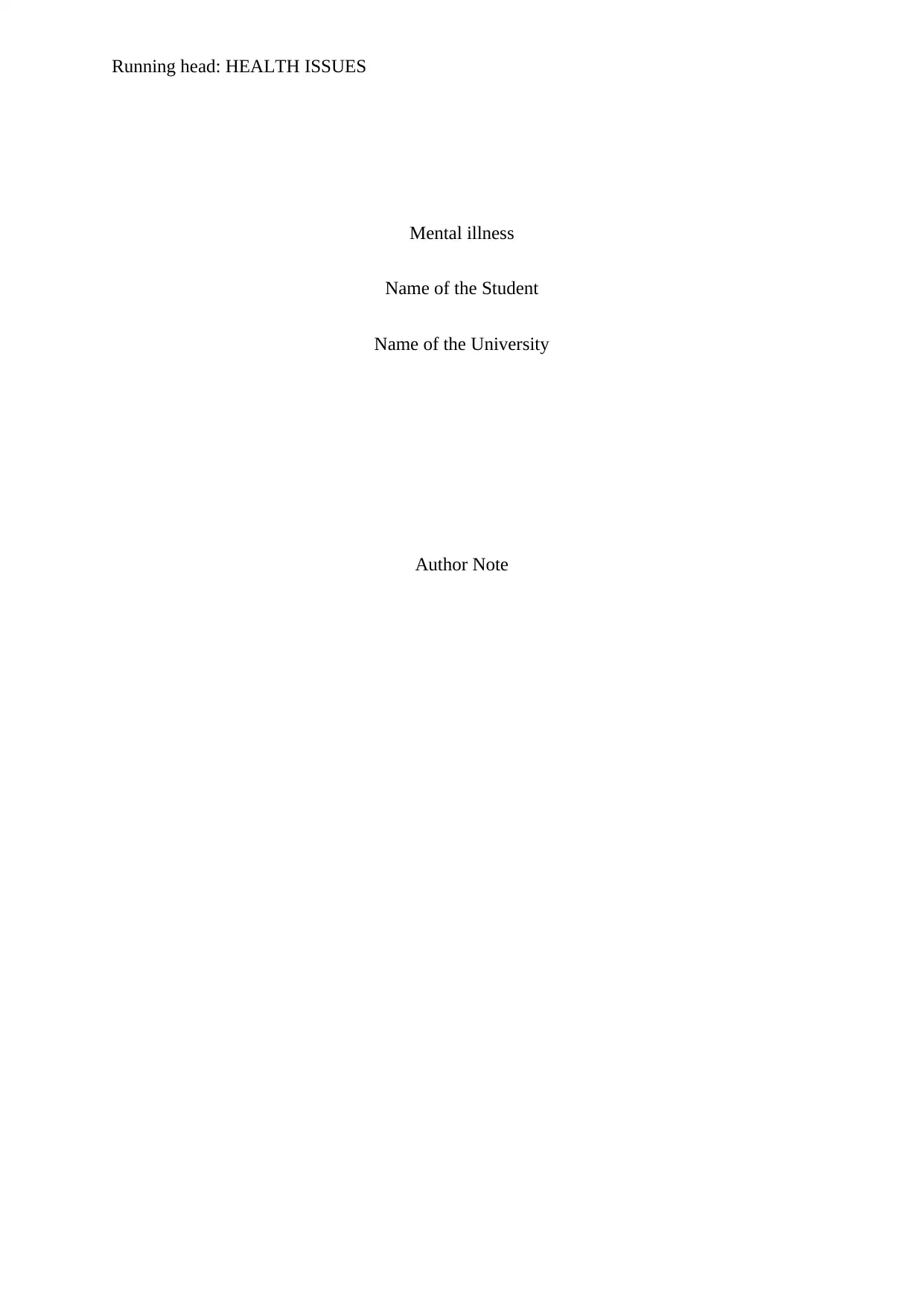
Running head: HEALTH ISSUES
Mental illness
Name of the Student
Name of the University
Author Note
Mental illness
Name of the Student
Name of the University
Author Note
Paraphrase This Document
Need a fresh take? Get an instant paraphrase of this document with our AI Paraphraser
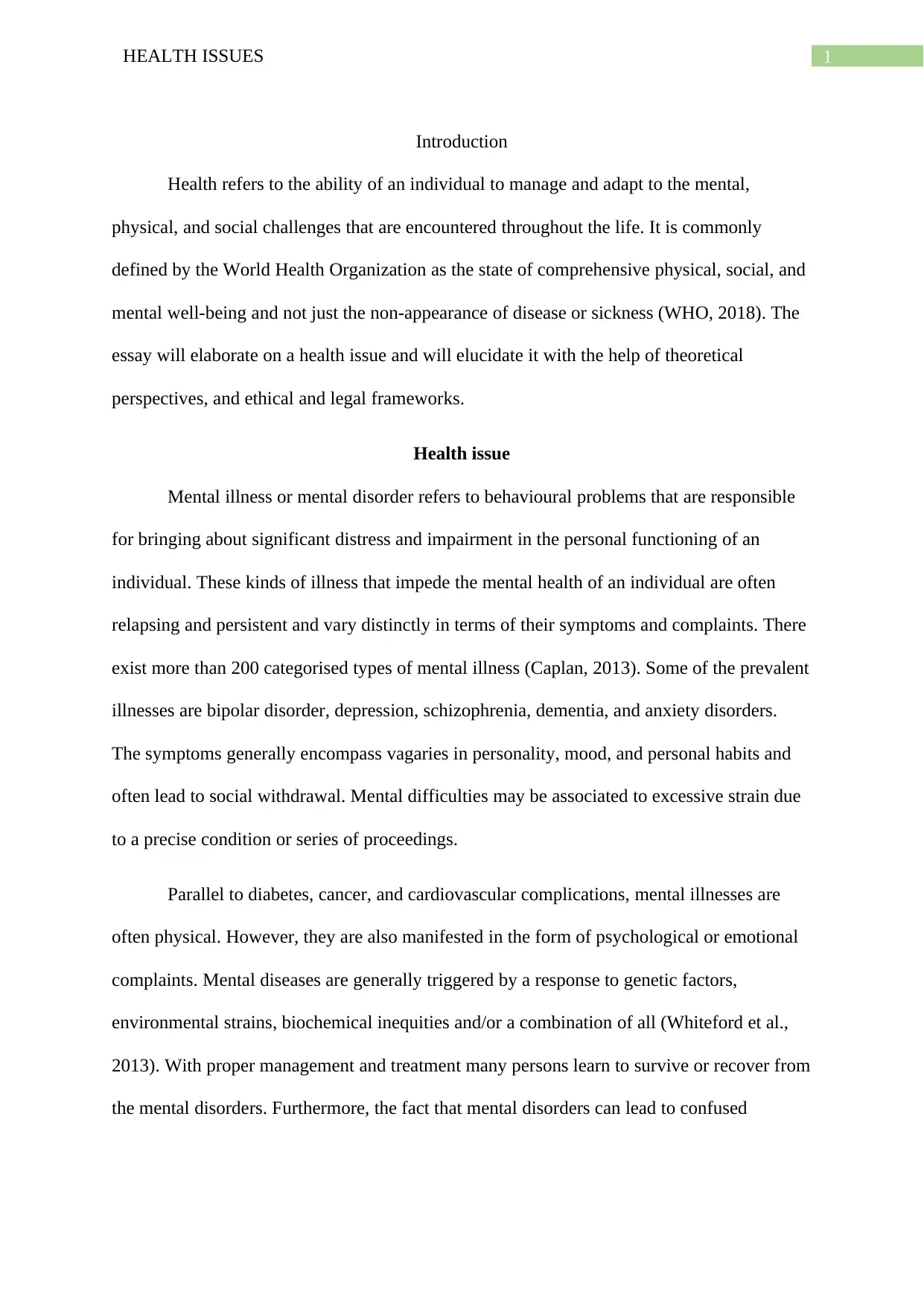
1HEALTH ISSUES
Introduction
Health refers to the ability of an individual to manage and adapt to the mental,
physical, and social challenges that are encountered throughout the life. It is commonly
defined by the World Health Organization as the state of comprehensive physical, social, and
mental well-being and not just the non-appearance of disease or sickness (WHO, 2018). The
essay will elaborate on a health issue and will elucidate it with the help of theoretical
perspectives, and ethical and legal frameworks.
Health issue
Mental illness or mental disorder refers to behavioural problems that are responsible
for bringing about significant distress and impairment in the personal functioning of an
individual. These kinds of illness that impede the mental health of an individual are often
relapsing and persistent and vary distinctly in terms of their symptoms and complaints. There
exist more than 200 categorised types of mental illness (Caplan, 2013). Some of the prevalent
illnesses are bipolar disorder, depression, schizophrenia, dementia, and anxiety disorders.
The symptoms generally encompass vagaries in personality, mood, and personal habits and
often lead to social withdrawal. Mental difficulties may be associated to excessive strain due
to a precise condition or series of proceedings.
Parallel to diabetes, cancer, and cardiovascular complications, mental illnesses are
often physical. However, they are also manifested in the form of psychological or emotional
complaints. Mental diseases are generally triggered by a response to genetic factors,
environmental strains, biochemical inequities and/or a combination of all (Whiteford et al.,
2013). With proper management and treatment many persons learn to survive or recover from
the mental disorders. Furthermore, the fact that mental disorders can lead to confused
Introduction
Health refers to the ability of an individual to manage and adapt to the mental,
physical, and social challenges that are encountered throughout the life. It is commonly
defined by the World Health Organization as the state of comprehensive physical, social, and
mental well-being and not just the non-appearance of disease or sickness (WHO, 2018). The
essay will elaborate on a health issue and will elucidate it with the help of theoretical
perspectives, and ethical and legal frameworks.
Health issue
Mental illness or mental disorder refers to behavioural problems that are responsible
for bringing about significant distress and impairment in the personal functioning of an
individual. These kinds of illness that impede the mental health of an individual are often
relapsing and persistent and vary distinctly in terms of their symptoms and complaints. There
exist more than 200 categorised types of mental illness (Caplan, 2013). Some of the prevalent
illnesses are bipolar disorder, depression, schizophrenia, dementia, and anxiety disorders.
The symptoms generally encompass vagaries in personality, mood, and personal habits and
often lead to social withdrawal. Mental difficulties may be associated to excessive strain due
to a precise condition or series of proceedings.
Parallel to diabetes, cancer, and cardiovascular complications, mental illnesses are
often physical. However, they are also manifested in the form of psychological or emotional
complaints. Mental diseases are generally triggered by a response to genetic factors,
environmental strains, biochemical inequities and/or a combination of all (Whiteford et al.,
2013). With proper management and treatment many persons learn to survive or recover from
the mental disorders. Furthermore, the fact that mental disorders can lead to confused
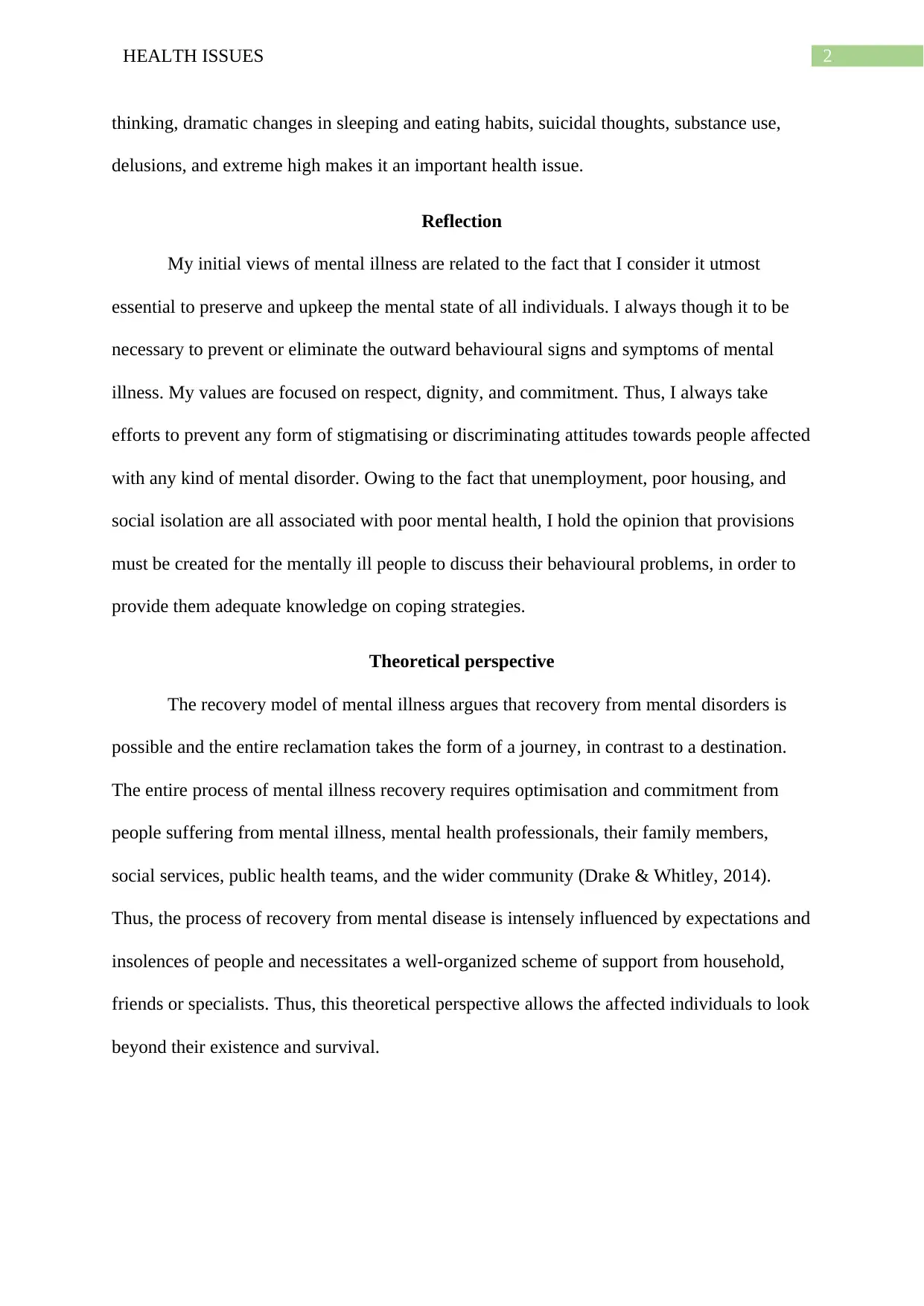
2HEALTH ISSUES
thinking, dramatic changes in sleeping and eating habits, suicidal thoughts, substance use,
delusions, and extreme high makes it an important health issue.
Reflection
My initial views of mental illness are related to the fact that I consider it utmost
essential to preserve and upkeep the mental state of all individuals. I always though it to be
necessary to prevent or eliminate the outward behavioural signs and symptoms of mental
illness. My values are focused on respect, dignity, and commitment. Thus, I always take
efforts to prevent any form of stigmatising or discriminating attitudes towards people affected
with any kind of mental disorder. Owing to the fact that unemployment, poor housing, and
social isolation are all associated with poor mental health, I hold the opinion that provisions
must be created for the mentally ill people to discuss their behavioural problems, in order to
provide them adequate knowledge on coping strategies.
Theoretical perspective
The recovery model of mental illness argues that recovery from mental disorders is
possible and the entire reclamation takes the form of a journey, in contrast to a destination.
The entire process of mental illness recovery requires optimisation and commitment from
people suffering from mental illness, mental health professionals, their family members,
social services, public health teams, and the wider community (Drake & Whitley, 2014).
Thus, the process of recovery from mental disease is intensely influenced by expectations and
insolences of people and necessitates a well-organized scheme of support from household,
friends or specialists. Thus, this theoretical perspective allows the affected individuals to look
beyond their existence and survival.
thinking, dramatic changes in sleeping and eating habits, suicidal thoughts, substance use,
delusions, and extreme high makes it an important health issue.
Reflection
My initial views of mental illness are related to the fact that I consider it utmost
essential to preserve and upkeep the mental state of all individuals. I always though it to be
necessary to prevent or eliminate the outward behavioural signs and symptoms of mental
illness. My values are focused on respect, dignity, and commitment. Thus, I always take
efforts to prevent any form of stigmatising or discriminating attitudes towards people affected
with any kind of mental disorder. Owing to the fact that unemployment, poor housing, and
social isolation are all associated with poor mental health, I hold the opinion that provisions
must be created for the mentally ill people to discuss their behavioural problems, in order to
provide them adequate knowledge on coping strategies.
Theoretical perspective
The recovery model of mental illness argues that recovery from mental disorders is
possible and the entire reclamation takes the form of a journey, in contrast to a destination.
The entire process of mental illness recovery requires optimisation and commitment from
people suffering from mental illness, mental health professionals, their family members,
social services, public health teams, and the wider community (Drake & Whitley, 2014).
Thus, the process of recovery from mental disease is intensely influenced by expectations and
insolences of people and necessitates a well-organized scheme of support from household,
friends or specialists. Thus, this theoretical perspective allows the affected individuals to look
beyond their existence and survival.
⊘ This is a preview!⊘
Do you want full access?
Subscribe today to unlock all pages.

Trusted by 1+ million students worldwide
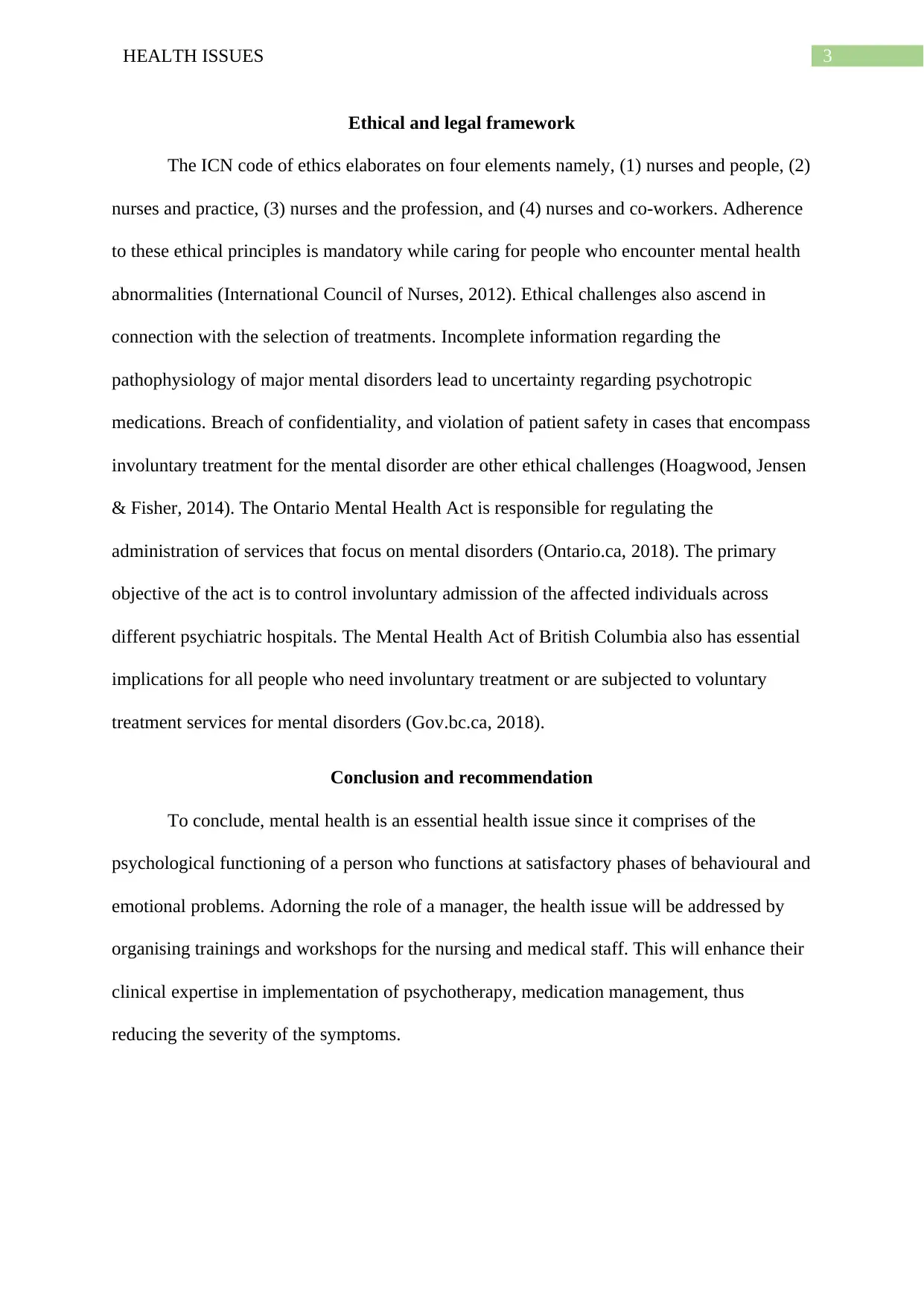
3HEALTH ISSUES
Ethical and legal framework
The ICN code of ethics elaborates on four elements namely, (1) nurses and people, (2)
nurses and practice, (3) nurses and the profession, and (4) nurses and co-workers. Adherence
to these ethical principles is mandatory while caring for people who encounter mental health
abnormalities (International Council of Nurses, 2012). Ethical challenges also ascend in
connection with the selection of treatments. Incomplete information regarding the
pathophysiology of major mental disorders lead to uncertainty regarding psychotropic
medications. Breach of confidentiality, and violation of patient safety in cases that encompass
involuntary treatment for the mental disorder are other ethical challenges (Hoagwood, Jensen
& Fisher, 2014). The Ontario Mental Health Act is responsible for regulating the
administration of services that focus on mental disorders (Ontario.ca, 2018). The primary
objective of the act is to control involuntary admission of the affected individuals across
different psychiatric hospitals. The Mental Health Act of British Columbia also has essential
implications for all people who need involuntary treatment or are subjected to voluntary
treatment services for mental disorders (Gov.bc.ca, 2018).
Conclusion and recommendation
To conclude, mental health is an essential health issue since it comprises of the
psychological functioning of a person who functions at satisfactory phases of behavioural and
emotional problems. Adorning the role of a manager, the health issue will be addressed by
organising trainings and workshops for the nursing and medical staff. This will enhance their
clinical expertise in implementation of psychotherapy, medication management, thus
reducing the severity of the symptoms.
Ethical and legal framework
The ICN code of ethics elaborates on four elements namely, (1) nurses and people, (2)
nurses and practice, (3) nurses and the profession, and (4) nurses and co-workers. Adherence
to these ethical principles is mandatory while caring for people who encounter mental health
abnormalities (International Council of Nurses, 2012). Ethical challenges also ascend in
connection with the selection of treatments. Incomplete information regarding the
pathophysiology of major mental disorders lead to uncertainty regarding psychotropic
medications. Breach of confidentiality, and violation of patient safety in cases that encompass
involuntary treatment for the mental disorder are other ethical challenges (Hoagwood, Jensen
& Fisher, 2014). The Ontario Mental Health Act is responsible for regulating the
administration of services that focus on mental disorders (Ontario.ca, 2018). The primary
objective of the act is to control involuntary admission of the affected individuals across
different psychiatric hospitals. The Mental Health Act of British Columbia also has essential
implications for all people who need involuntary treatment or are subjected to voluntary
treatment services for mental disorders (Gov.bc.ca, 2018).
Conclusion and recommendation
To conclude, mental health is an essential health issue since it comprises of the
psychological functioning of a person who functions at satisfactory phases of behavioural and
emotional problems. Adorning the role of a manager, the health issue will be addressed by
organising trainings and workshops for the nursing and medical staff. This will enhance their
clinical expertise in implementation of psychotherapy, medication management, thus
reducing the severity of the symptoms.
Paraphrase This Document
Need a fresh take? Get an instant paraphrase of this document with our AI Paraphraser
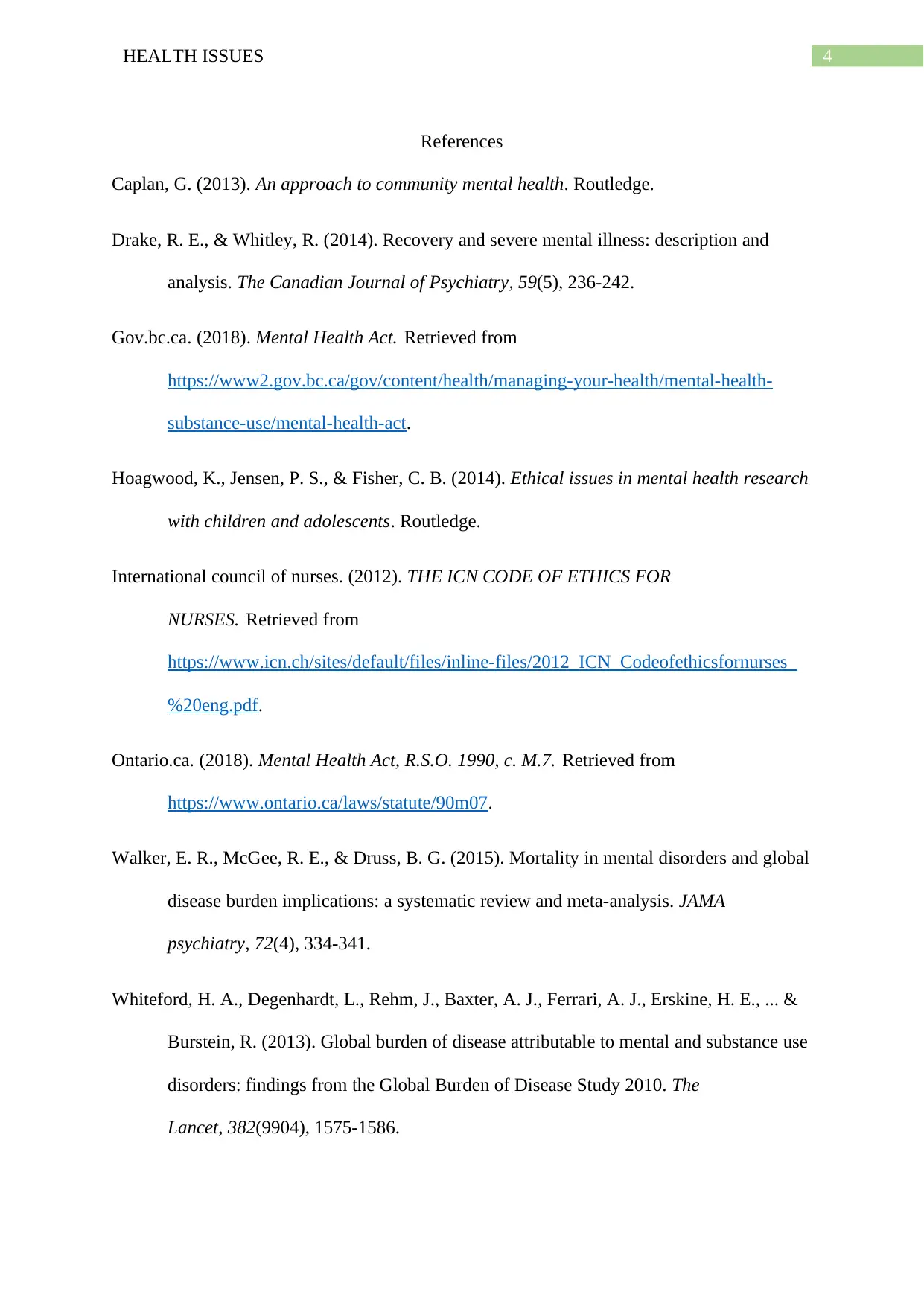
4HEALTH ISSUES
References
Caplan, G. (2013). An approach to community mental health. Routledge.
Drake, R. E., & Whitley, R. (2014). Recovery and severe mental illness: description and
analysis. The Canadian Journal of Psychiatry, 59(5), 236-242.
Gov.bc.ca. (2018). Mental Health Act. Retrieved from
https://www2.gov.bc.ca/gov/content/health/managing-your-health/mental-health-
substance-use/mental-health-act.
Hoagwood, K., Jensen, P. S., & Fisher, C. B. (2014). Ethical issues in mental health research
with children and adolescents. Routledge.
International council of nurses. (2012). THE ICN CODE OF ETHICS FOR
NURSES. Retrieved from
https://www.icn.ch/sites/default/files/inline-files/2012_ICN_Codeofethicsfornurses_
%20eng.pdf.
Ontario.ca. (2018). Mental Health Act, R.S.O. 1990, c. M.7. Retrieved from
https://www.ontario.ca/laws/statute/90m07.
Walker, E. R., McGee, R. E., & Druss, B. G. (2015). Mortality in mental disorders and global
disease burden implications: a systematic review and meta-analysis. JAMA
psychiatry, 72(4), 334-341.
Whiteford, H. A., Degenhardt, L., Rehm, J., Baxter, A. J., Ferrari, A. J., Erskine, H. E., ... &
Burstein, R. (2013). Global burden of disease attributable to mental and substance use
disorders: findings from the Global Burden of Disease Study 2010. The
Lancet, 382(9904), 1575-1586.
References
Caplan, G. (2013). An approach to community mental health. Routledge.
Drake, R. E., & Whitley, R. (2014). Recovery and severe mental illness: description and
analysis. The Canadian Journal of Psychiatry, 59(5), 236-242.
Gov.bc.ca. (2018). Mental Health Act. Retrieved from
https://www2.gov.bc.ca/gov/content/health/managing-your-health/mental-health-
substance-use/mental-health-act.
Hoagwood, K., Jensen, P. S., & Fisher, C. B. (2014). Ethical issues in mental health research
with children and adolescents. Routledge.
International council of nurses. (2012). THE ICN CODE OF ETHICS FOR
NURSES. Retrieved from
https://www.icn.ch/sites/default/files/inline-files/2012_ICN_Codeofethicsfornurses_
%20eng.pdf.
Ontario.ca. (2018). Mental Health Act, R.S.O. 1990, c. M.7. Retrieved from
https://www.ontario.ca/laws/statute/90m07.
Walker, E. R., McGee, R. E., & Druss, B. G. (2015). Mortality in mental disorders and global
disease burden implications: a systematic review and meta-analysis. JAMA
psychiatry, 72(4), 334-341.
Whiteford, H. A., Degenhardt, L., Rehm, J., Baxter, A. J., Ferrari, A. J., Erskine, H. E., ... &
Burstein, R. (2013). Global burden of disease attributable to mental and substance use
disorders: findings from the Global Burden of Disease Study 2010. The
Lancet, 382(9904), 1575-1586.
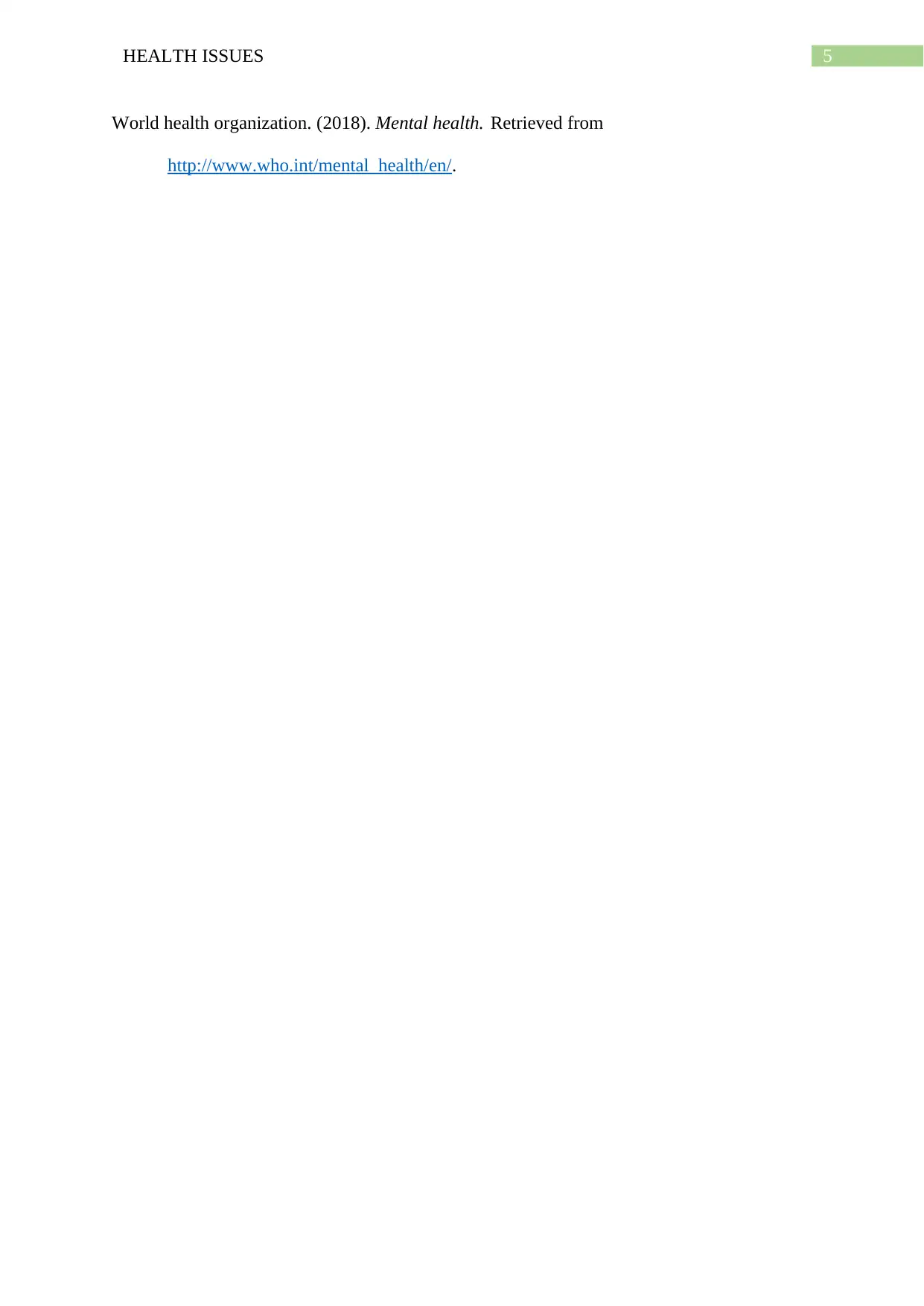
5HEALTH ISSUES
World health organization. (2018). Mental health. Retrieved from
http://www.who.int/mental_health/en/.
World health organization. (2018). Mental health. Retrieved from
http://www.who.int/mental_health/en/.
⊘ This is a preview!⊘
Do you want full access?
Subscribe today to unlock all pages.

Trusted by 1+ million students worldwide
1 out of 6
Related Documents
Your All-in-One AI-Powered Toolkit for Academic Success.
+13062052269
info@desklib.com
Available 24*7 on WhatsApp / Email
![[object Object]](/_next/static/media/star-bottom.7253800d.svg)
Unlock your academic potential
Copyright © 2020–2026 A2Z Services. All Rights Reserved. Developed and managed by ZUCOL.





